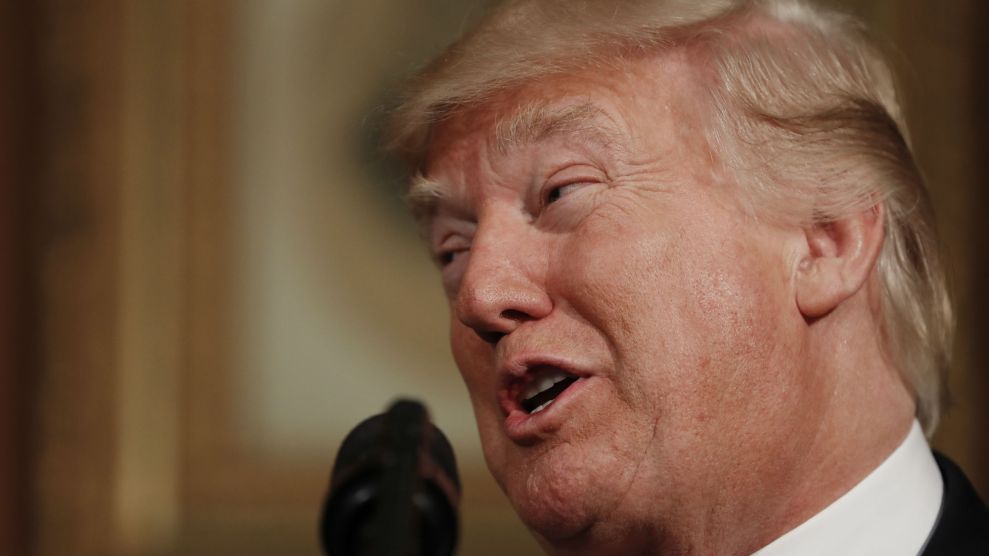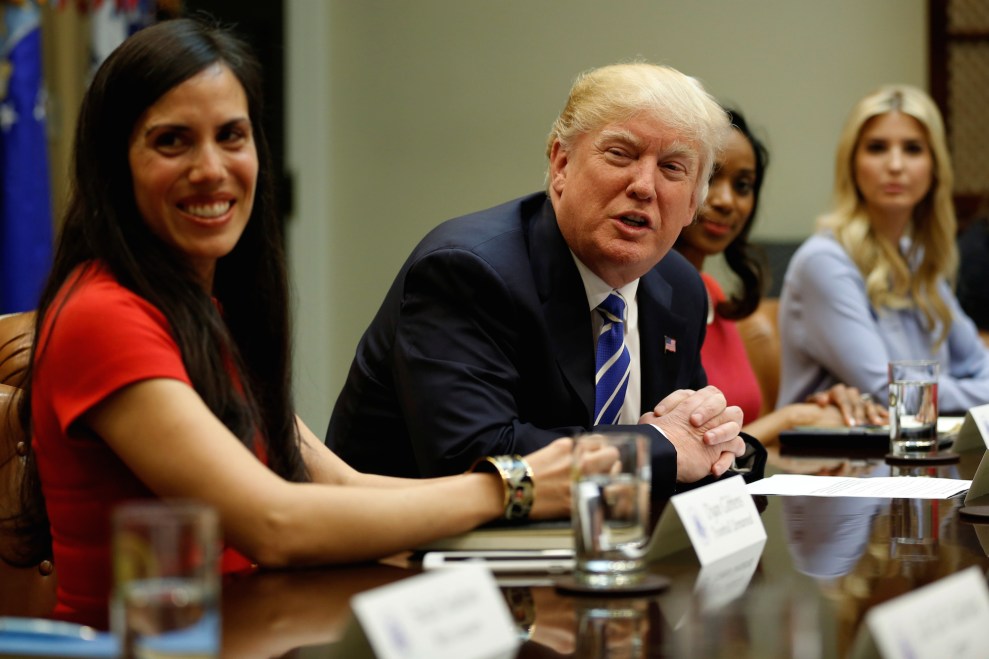
Carolyn Kaster/AP
This story originally appeared on ProPublica.
A political appointee hired by the Trump administration for a significant State Department role was accused of multiple sexual assaults as a student several years ago at The Citadel military college.
Steven Munoz was hired by the Trump administration as assistant chief of visits, running an office of up to 10 staffers charged with the sensitive work of organizing visits of foreign heads of state to the U.S. That includes arranging meetings with the president.
At The Citadel, five male freshmen alleged that Munoz used his positions as an upperclassman, class president and head of the campus Republican Society to grope them. In one incident, a student reported waking up with Munoz on top of him, kissing him and grabbing his genitals. In another, on a trip to the Conservative Political Action Conference in Washington, D.C., a student said that Munoz jumped on him in bed and he “felt jerking and bouncing on my back.”
An investigation by The Citadel later found that “certain assaults likely occurred.” A local prosecutor reviewed the case and declined to seek an indictment.
Munoz’s hiring raises questions about the Trump administration’s vetting of political appointees, which has been both slow and spotty, with multiple incidents of staff being fired only weeks into their jobs, including for disloyalty to Trump. The White House didn’t respond to a request for comment.
Munoz, a Miami native, worked as a political consultant in South Carolina after graduating from The Citadel in 2011. He was publicly reported to be under investigation the following year around the time he was working for Rick Santorum’s presidential campaign. Stories from that time, which outline some but not all of the allegations against Munoz, are easy to find via a simple Google search.
Details of the case, drawn from an extensive, previously unreported police case file, also raise questions about The Citadel’s response to the alleged string of assaults, according to experts in campus sexual assault. After one student reported to a school official in 2010 that Munoz had sexually assaulted him, The Citadel didn’t discipline Munoz. Instead, it gave him a warning.
Over the next year and a half, Munoz allegedly assaulted four other students. Those incidents weren’t reported until well after Munoz graduated in 2011.
Munoz referred questions to his lawyer, the prominent Charleston defense attorney Andy Savage, who denied the allegations. “I believe that certain disgruntled cadets made exaggerated claims of wrongdoing concerning Munoz’s participation in boorish behavior that was historically tacitly approved, if not encouraged, by the Institution,” Savage said.
Upon graduation, The Citadel gave Munoz an award for “leadership, sound character and service to others.” The citation said he could “always be counted upon to help classmates who need assistance and to mentor younger cadets adjusting to life at The Citadel.”
A Citadel spokeswoman, Kim Keelor, said the committee that gave the award would not have known about the 2010 allegation because of privacy law. Keelor said of the case overall: “The college proceeded thoughtfully in addressing the reports in accordance with its policy and related processes, and with great concern for those involved and the protection of their privacy.”
When more students came forward the year after Munoz graduated, The Citadel banned him from campus and referred the case to state police, who did an extensive investigation.
When The Citadel later conducted its investigation, it interviewed complainants and witnesses and concluded in 2014 that assaults occurred “based upon a ‘preponderance of evidence,'” according to a statement from the school to ProPublica.
The Citadel is a storied public college based in Charleston, South Carolina, where students, known as cadets, get military instruction as well as traditional coursework. Many join the armed services after graduation.
Freshman are dubbed “knobs” for their shaved haircuts. They go through what the school refers to as “strict indoctrination.” They are subordinate to upperclassmen. There have been repeated hazing problems for many years, and there was a major scandal involving sexual abuse at the school’s summer camp in the mid-2000s.
The students who accused Munoz of assaults say that he abused his power as an upperclassman and student leader.
Here is what one Citadel student told police about his encounters with Munoz in 2009 and 2010 during his freshman year:
“Munoz coerced threatened and convinced me to allow inappropriate touching, grabbing, and kissing by leading me to believe it was what I needed to do to gain acceptance in the corps of cadets. He threatened to call my upperclassmen who would be upset if I did not comply with him.”
The student told police he and Munoz would sometimes return to campus early and stay at the home of a Citadel professor, where “during the night Munoz would enter my room and continue the touching.”
Another student who was a freshman in 2011 traveled with Munoz, then a senior, as part of the Republican Society trip to the annual CPAC event in Washington. The student later said in a statement to police that Munoz had jumped on him two times. In one incident, after the freshman was caught with alcohol, Munoz informed the younger student that he would not be citing him for the violation, then came into the freshman’s hotel room:
“I was groggy, [Munoz] jumped on me, I felt jerking and bouncing on my back, I threw my elbow up which threw him off the bed to the floor.”
A third student, who met Munoz through the Republican Society, described Munoz setting up a series of meetings with him alone in Munoz’s room to talk about how to get leadership positions in campus organizations.
“He instructed me to sit on his bed during these meetings. … After a few meetings he began to rub my leg with his hand. He moved his hand under my shorts and the first time I pushed his hand off my leg he said he was just playing and that he did it with his other knobs so I shouldn’t mind. I had seen this in the past and when I asked my classmates about the interaction, they said when they resisted, he yelled at them for not trusting him and Mr. Munoz made them stay longer in his room.”
In another meeting, Munoz “put his other hand down my underwear until I again pushed him away, but he did not stop. He said as a new leader I had to learn to trust other leaders on the team and this was how I should show him I trusted him.” Munoz said “he read the Bible and knew what it said and I should not question his love of God. He continued to rub my leg and rub my private area. … He said this needed to stay between us and dismissed me.”
The first incident reported to the school took place in April 2009. As later recounted by a state police investigator, Munoz, then a sophomore, and a freshman were at an off-campus house watching TV and consensually spooning. The freshman later woke up in the middle of the night, “thinking he was having a wet dream, but it was Munoz on top of him with fully body contact, kissing him with his tongue in his mouth. Munoz had his left hand down [the other student’s] shorts touching his penis.”
The following year, in February 2010, the student reported that incident to a Citadel official, Sexual Assault Response Coordinator Janet Shealy. The reporting student told Shealy he didn’t “want to do anything but informal,” according to her notes.
School officials set up a mediation session in which Munoz and the other student met in a conference room. In that meeting, according to Shealy’s notes, Munoz “said it was consensual and that accuser started it.” The other student left “upset,” saying that Munoz had “lied.”
Shealy and another Citadel official, Col. Christopher “Hawk” Moore, met with Munoz again to tell him there would be no disciplinary action taken. Munoz was warned and told to write a statement about what happened.
Experts on campus sexual assault questioned how The Citadel handled that initial report.
“The school has the responsibility to keep people safe on campus,” said Colby Bruno, an attorney at Victim Rights Law Center. “The school should have investigated this more thoroughly. Instead of investigation they went to this mediation.”
Bruno pointed out that the federal government’s guidance on how schools should respond to sexual assault under federal civil rights law explicitly says that even voluntary mediation is not appropriate in assault cases.
“Sexual assault is about power and control,” Bruno said. “You can’t sit two people down who have an imbalance of control and power to have a balanced mediation.”
Citadel spokeswoman Keelor said in a statement that the school’s policy on mediation differs from the federal guidance “because it was developed under the direction of the Department of Justice and the federal courts during the school’s transition to coeducation” in 1996.
Keelor said after the 2010 assault report “the college conducted an investigation.” She said the school could not give details about any specific case. But she said in a statement that generally an “informal investigation” would include interviewing both students and providing options for support services. The statement also details how the Citadel requires sexual assault prevention classes for each year of a student’s time at the school.
Shealy, The Citadel’s sexual assault response coordinator, declined to comment.
Bruno said a thorough investigation would include speaking to potential witnesses or people who had seen Munoz or the other student soon after the alleged assault.
When more students came forward in fall 2012 — more than a year after Munoz graduated — The Citadel referred the case to the state police, the South Carolina Law Enforcement Division. The school also sent a campus-wide email notifying students of the allegations and banned Munoz, then an alumnus, from campus.
One student said in a statement to campus police that he had come forward so long after what happened because he had heard of other incidents and “I want this school to be safe from sexual predators.”
Over the course of several months, police interviewed the five alleged victims, who said they were willing to press charges. (None of them responded to our requests for comment.) The incidents were classified variously as forcible fondling, sexual battery and simple assault.
In March 2013, the state police referred the case to the office of the Charleston County prosecutor, Solicitor Scarlett Wilson. A week after receiving the nearly 200-page case file, the prosecutor said in a letter to police that her office would not seek indictments against Munoz because “there is no probable cause that he committed a crime prosecutable in General Sessions Court.”
Wilson’s office did not respond to requests for comment.
In 2014, according to The Citadel, Munoz requested that the school review its decision to ban him from campus. That’s when the school conducted its own investigation and found that “certain assaults likely occurred.”
Later that year, the school partially rescinded the no-trespass order, “permitting general access to public facilities and events, but no direct cadet interactions.” Asked why, the school pointed to the prosecutor’s decision not to seek indictments.
Savage, Munoz’s lawyer, said in his statement: “Steven Munoz, a graduate of the Corp with a sterling reputation for honesty, integrity and all Corp values, was used as a whipping boy in an attempt by the institution to change its shameful image shaped by its ignorance of the conduct of Skip ReVille and Michael Arpaio.” ReVille and Arpaio were at the center of widely covered Citadel sexual assault and child abuse scandals.
At the time two of the allegations against Munoz surfaced in 2012, Savage told The Post and Courier newspaper that the allegations were not only false, but also politically motivated. Savage claimed that an unnamed Citadel employee — who was also the mother of one of the alleged victims — had released information on the allegations because she disliked Munoz’s conservative politics. Savage declined our request to provide details to substantiate his claim.
Savage also criticized the investigation of the case, saying that “several cadets complained that they were being pressured to provide misleading statements.” They were “pressured to report interactions that the cadets considered typical barracks banter as if they felt it was inappropriate,” he said.
When asked for details, Savage provided the name of one student, who Savage said was a witness, not a victim. The student is not cited as a witness in the nearly 200-page police case file, and was not immediately available for comment.
Savage also criticized the school’s investigation, saying he was not given enough time to provide witnesses or statements.
Since Munoz graduated, he has been president of a Charleston-based political consulting firm called American Southern Group, according to his LinkedIn profile. The Trump campaign paid the firm tens of thousands of dollars for “event consulting,” according to disclosure filings.
Munoz was then hired to work on Trump’s inaugural committee.
He joined the State Department on Jan. 25, a spokesperson confirmed. The agency declined to comment further.
During the Obama administration, vetting of potential political appointees like Munoz was extensive. A possible hire would be thoroughly examined by the White House Office of Presidential Personnel before being offered a job. That would include everything from a Google search to running a person’s name through criminal records and news databases.
Any significant negative media reports or criminal accusations would lead a file to be flagged for further scrutiny by White House lawyers, according to a former staffer in the office who vetted Obama appointees. Sexual assault allegations would be a serious flag. In the Obama years, candidates under consideration for jobs were passed over because of, for example, a drunk driving case or for being a registered lobbyist.
President Trump’s personnel office is being run by a former Republican Capitol Hill staffer, Johnny DeStefano. But not much is known about how the office checks the backgrounds of political appointees. The White House didn’t respond to a request for comment about details of its vetting process.
Timeline
April 2009: Alleged assault of Student #1 occurs.
November 2009-May 2010: Alleged assaults of Student #2 occur.
February 2010: Student #1 reports assault to The Citadel.
February-March 2010: School officials meet with Munoz and Student #1 for mediation. Officials warn Munoz but take no disciplinary action.
April 2010: Alleged assault of Student #3 occurs.
February 2011: Alleged assault of Student #4 occurs.
March-April 2011: Alleged assault of Student #5 occurs.
May 2011: Munoz graduates.
September 2012: After receiving more reports of past alleged assaults, The Citadel refers case to state police. The school bans Munoz, now an alumnus, from campus.
March 2013: After an investigation of over five months, state police send case file to the office of the prosecutor, Solicitor Scarlett Wilson.
March 2013: Prosecutor declines to seek indictments.
2014: Munoz requests that school review no trespass order. The Citadel “conducted an investigation, interviewing complainants and witnesses. Based upon a ‘preponderance of evidence,’ it was concluded that certain assaults likely occurred,” according to a spokesperson.
Later in 2014, the no-trespass order was partially rescinded, allowing Munoz to attend public events at the college, but limiting interactions with students.
















